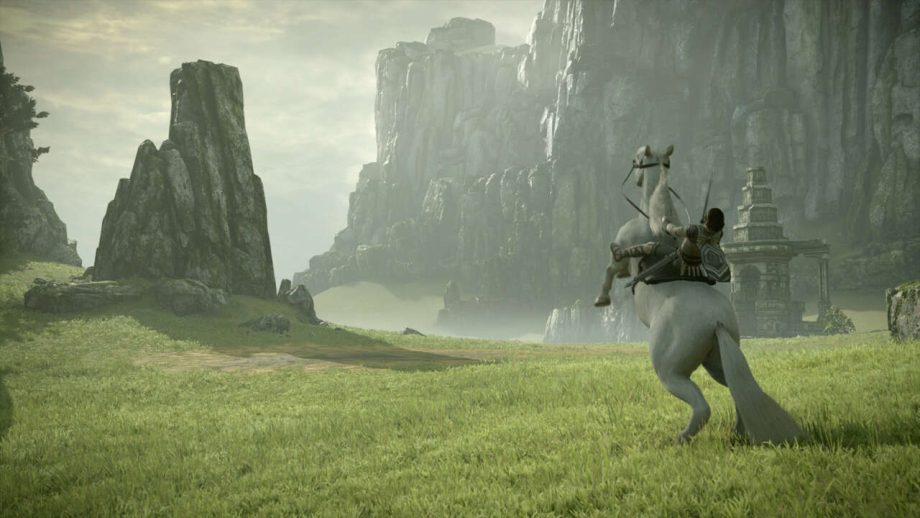Shadow of the Colossus is celebrating its 20-year anniversary today, October 18, 2025. Below, we examine the moral complexity of its narrative as told through its silent protagonist.
Does a silent protagonist equal a self-insert? The logic of many video games dictates yes. Heroes like Gordon Freeman and Link have been forever silent, only grunting or shouting. Even Master Chief, who does have a voice, obscures his face. Under his mask, there could be anyone there.
Despite this common logic, silence is often alienating. Few games embody this better than the works of Fumido Ueda. The protagonists of Shadow of the Colossus, Ico, and The Last Guardian are taciturn, often silent or speaking only a fantastical language, which is either subtitled or not immediately understood. Moments of speech, or even of action outside of player input, are profound and rare.
Under the logic of silent identification, these protagonists would be simple, iconographic player stand-ins. Yet Ueda’s curated gaps create an empathetic distance from his games’ heroes. Over the 20 years since Shadow of the Colossus’ release, it has proven its profundity as a moral fable because of its distance from the player.
What Makes Shadow Of The Colossus A Masterpiece?
Please use a html5 video capable browser to watch videos.
This video has an invalid file format.
Sorry, but you can’t access this content!
Please enter your date of birth to view this video
By clicking ‘enter’, you agree to GameSpot’s
Terms of Use and Privacy Policy
This is not to say that Shadow of the Colossus is uninterested in the video game form. Protagonist Wander’s quest is grounded in games past. He seeks to rescue his love from death. To do so, he must slay the titular colossi: massive foes strewn across a forbidden land. The entity spurring Wander on, Dormin, is a voice from the heavens haloed in light. Wander wields a legendary sword–one whose connection with the sun guides him on his quest. In every superficial sense, he is the epitome of a hero. He has a noble quest, a holy tool, and monstrous foes meant for killing.
Yet, Wander is the aggressor. For many of the colossi, he must fire his bow and arrow at them to even gain their attention. It is only when he intrudes on their space, and often not until he attacks them, that they will attack him. The colossi bleed black. It spurts from them as Wander stabs them. They moan, flail, weep, and scream as he climbs over and on them. Each colossus has an animal nobility, which Wander murders. Each element is a part of Shadow of the Colossus’ rhetoric. Collectly, they change the usual aspects of heroic fantasy into something horrifying.
Yet, Wander is not a cypher or a stand-in. Often, games with silent protagonists start from a position of relative normalcy. Think of Gordon Freeman’s long train ride to the office in Half-Life, or Link’s childhood stomping ground of Kokiri Forest in Ocarina of Time. In Shadow of the Colossus, we start midway through Wander’s journey as he travels on horseback over the land. When he arrives and places his love Mono on an altar, we learn only a few things about him. One, he carries an “ancient sword,” as Dormin calls it. Two, he is attempting to free his love from death and some curse. Three, his horse Agro is a loyal and courageous companion. There is the suggestion of a life lived outside the bounds of the games. There are things that matter that the player cannot yet see or know about.
Furthermore, Wander’s exact motivations are shadowy. His relationship with Mono is never depicted. Instead we see how he acts without her. His journey to kill the colossi is strenuous and dangerous both, yet he continues with almost unfailing motivation. The player can direct him to stand over Mono’s body on the altar. The camera zooms in, intimate in a way the game rarely is otherwise. Wander’s love is profound, and perhaps selfish given how much he will destroy to see it restored, yet we do not witness it, and thus struggle to identify with it directly. Shadow of the Colossus builds this understanding through gestures that accumulate into cascading meaning.
Through these gestures, the game takes on a theatrical quality. The player inhabits Wander as an actor might play a role. The player makes some choices, like how often he visits Mono between besting colossi or whether their own skill will define him as a dexterous warrior or a clumsy, though strong-willed, commoner. Yet, the form is set. Wander has made his choices. The player can only interpret them.
This is a massive contrast with many other games, which are often concerned with the main character’s morality. BioShock and Spec Ops: The Line, for example, use the main character as a player surrogate. BioShock’s plot twist emphasizes how little agency the player actually has in the story, turning its hero into a hapless stooge. In Spec Ops: The Line, the player’s will to finish the game and protagonist Walker’s belief in the importance of his mission are equivocated. As Walker’s determination damns him, it implicates the player too. In loading screens and monologues, Spec Ops admonishes the player to stop playing.

Both these games have a little more under the hood than mere player condemnation, yet there is something shallow about their approach to protagonist morality. The developers themselves are curiously absent from this logic, for example. BioShock’s twist has dramatic force, but little emotional heft. The protagonist isn’t anyone; he is only a tool. The twist relies on player identification that comes only from absence. Spec Ops: The Line fairs better in this regard. Walker is a character of at least two dimensions. Yet, if he is a character who acts on his own terms, why all this discussion of player complicity? The moral swing cannot quite implicate the player in any real way.
Shadow of the Colossus is also interested in agency, but not that of the player–, rather, of Wander himself. BioShock and Spec Ops are both loud. Antagonists Andrew Ryan and John Konrad explain tell the themes to the player in direct terms. Shadow of the Colossus is quiet. Its world is full of empty spaces and empty time. That emptiness leads to an empathetic, though still distant, stance. Through the process of play, the player comes to understand Wander. That process of embodiment is fuzzy, mythical, not simple or reducible. Shadow of the Colossus doesn’t treat the player as a hapless stooge, unable to really understand the situation at hand until the game’s writers offer their magnanimous help. Wander’s wrongdoing is not a twist. That fact allows the player to sit with it, even to embody it for a time.
Condemnation is cheap; it is understanding that is hard won and difficult. Though Walker has more voice lines and more writing, Wander still feels more real because his personhood is not attached to the player. Instead, there is a sense of an exchange. We feel for Wander and mourn for him. That relationship has a deeper and more profound bearing on our own morality than simple condemnation. If we ask whether we are guilty, Shadow of the Colossus will always be silent.
At the game’s end, after a fellowship sworn to stop Wander arrives and seals him within the forbidden land, Wander goes where the player cannot follow. The sealing process has turned him into a child, which the successfully resurrected Mono seems to want to raise. All of Wander’s heroics and strength have been sapped out of him. He is now a creature incapable of holding a controller.
That ambiguous end is part of what gives Shadow of the Colossus its lasting power. We were Wander’s companions for a time. We walked with him. But his fate is his own. So too, is ours.






